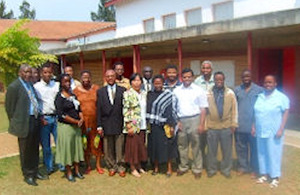DFID Research: Connecting African scientists with the media
The Panos Relay programme helps create a lasting partnership between African researchers and the media.

UNISWA researchers
“One of the problems scientists and science institutions have is to relate their work to the common people. They look at science as something abstract. The role of that person is to put a message that science is something that is relevant…So that’s what we want - that everything we do, we want to explain how it will benefit the people” - Dr Lewanika-Mbikusita Mwananyanda, Director of the National Institute for Scientific and Industrial Research.
Panos London’s Relay: Communicating Research programme works around the world to help build relationships between researchers and journalists in order to communicate research findings to a broad audience through the media. Relay, which is supported by DFID, has begun providing support for researchers in a formalised way, creating a more lasting partnership between researchers and the media.
Both the former and current directors of Swaziland University Research Center (URC) had participated in workshops run by Relay, so when they decided the URC needed to communicate its research better, they contacted Relay to become a partner in the process.
In 2007, Relay and the University of Swaziland (UNISWA) signed a memorandum of understanding to develop and deliver effective communication strategies and to train UNISWA researchers on how to communicate better with the media. As a result Relay ran UNISWA-sponsored workshops to teach researcher staff to prepare material for dissemination through the media they are also working together on a research communication manual.
Drawing on the success of this model Relay has signed similar contracts with the University of Malawi, the Mozambique Eduardo Mondlane University, and the University of Zambia departments of Mass Communication and School of Agriculture. The feedback has been positive:
“…the media have covered my work on governance,” said Professor Wiseman Chirwa, in Malawi. “My involvement with the Human Rights Commission on research and documentation component has generated a number of studies… the coverage by the media has been good on the research.”
This support has already created a visible difference in the way researchers at UNISWA communicate to the media. “I now have the skills to write a media friendly press release that can be turned into a newsworthy article,” said one UNISWA researcher. Relay’s involvement with UNISWA has sparked a change in researchers’ attitudes towards media, and the media is getting more involved in research as a result.
“Most of the media practitioners are making an effort to make follow up on research presentations where they were not present,” said another UNISWA researcher. “They are inquiring about the new research that I may be doing or intend to embark on.”